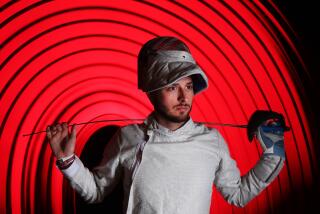‘94 Winter Olympic Games / Lillehammer : LUGE : Kennedy to Go on the Attack
- Share via
HUNDERFOSSEN, Norway — Duncan Kennedy of the United States planned to spend Sunday night playing video games in the Olympic village and sharpening his putting stroke on the synthetic green.
“I’m comfortable where I’m at,” he said, referring to his position on the luge leader board, as well as in the game room.
“The pressure is on the people ahead of me. They have to hold on, while I can attack,” he said. “I have nothing to lose. I have a lot of room in which to move.”
Whereas teammate Wendel Suckow was a disappointing ninth after two of four heats, Kennedy was fourth, separated by a split second, perhaps, from the first U.S. medal in luge.
“It’s what we wanted, to be in reach,” Coach Wolfgang Schadler said.
“It’s a good setup. I’m sure he’ll attack (in today’s final two heats).”
After cautiously finishing 10th and 14th in his two previous Olympics, Kennedy vowed to “fly or die” in the Norwegian woods and did just that in his second heat Sunday, picking up two places with the third-fastest time of the heat.
He has a cumulative 1 minute 41.220 seconds compared to 1:40.856 for leader Georg Hackl of Germany; 1:40.866 for Austria’s Markus Prock, and 1:41.042 for Italy’s Armin Zoggeler.
“I’m aiming beyond that,” Kennedy said when it was mentioned that he is only two-tenths out of third.
“There are some great sliders ahead of me, but anything can happen and I’ve been consistent all week.”
All season, actually. He was second on the World Cup circuit, behind Prock. Hackl, the defending Olympic champion, was third in World Cup and under fire by the German media, who questioned his Olympic preparation in the wake of his erratic World Cup season.
“I think they think I can’t count to three,” he said of his nation’s media after providing a blistering response to their criticism.
Starting first in the first heat on a sunny, windless morning of 11 degrees, the 27-year-old German soldier set a track record of 50.296 seconds.
Checking the clock at the top of the hill, Kennedy said he smiled and thought to himself, “Same old Georg.”
“Some people were counting him out, but the same thing happened before Albertville (and the 1992 Olympics),” Kennedy said. “I knew that was a mistake. I think Georg just likes to sandbag a little.”
Hackl also had the best time in the second heat--50.560 seconds, but is only a tenth ahead of Prock.
“That’s only luck,” Prock said of the small difference. “It should be an exciting fight between me and Hackl.”
That eliminates Zoggeler and Kennedy, who isn’t buying it, of course.
“I’m here to take risks,” he said. “Why not?”
Kennedy was sixth at 50.587 after the first heat, saying he might have been a bit too cautious at certain points.
He started first in the reverse order of the second heat and virtually had to jump on the sled without thinking about it when he misjudged his preparation time during the 20 minutes between heats.
His 50.633 on a track rutted by the first heat enabled him to move past Arnold Huber of Italy and Jens Muller of Germany, fourth and fifth previously.
Suckow, the 1993 World Champion who was fourth on the World Cup circuit, had times of 50.698 and 50.819, paying a price for his lack of aggressiveness at the start, Schadler said.
Suckow agreed. “I’d be lying if I said I wasn’t disappointed,” he said. “I was tense and sloppy in the first heat. I felt that I slid better in the second, but the time didn’t reflect it. I just want to come out of tomorrow feeling I did the best I could do.”
“At this level, if you finish in the top six, the top 10, you have to feel good, and the nice thing is that I’ll always have the world title. No can take that away.”
Kennedy, too, said he is here to have fun, do the best he can do, but an Olympic medal would underscore his development in a sport dominated by Europeans and culminate a season in which he gained worldwide recognition and applause for his confrontation with German skinheads.
However, unlike World Cup races, which comprise only two heats, Kennedy will have to think about his situation overnight. Depending, of course, on how he putts.
More to Read
Go beyond the scoreboard
Get the latest on L.A.'s teams in the daily Sports Report newsletter.
You may occasionally receive promotional content from the Los Angeles Times.






